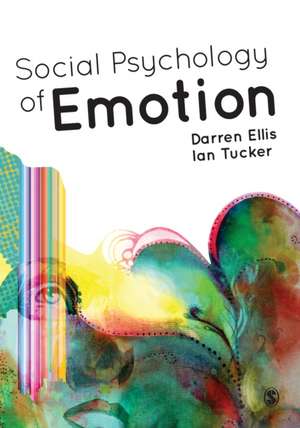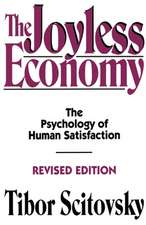Social Psychology of Emotion
Autor Darren Ellis, Ian Tuckeren Limba Engleză Paperback – 30 apr 2015
This book analyses historical, philosophical, psychological, biological, sociological, post-structural, and technological perspectives of emotion that it argues are important for a viable social psychology of emotion. It begins with early ancient philosophical conceptualisations of pathos and ends with analytical discussions of the transmission of affect which permeate the digital revolution.
It is essential reading for upper level students and researchers of emotion in psychology, sociology, psychosocial studies and across the social sciences.
| Toate formatele și edițiile | Preț | Express |
|---|---|---|
| Paperback (1) | 198.53 lei 3-5 săpt. | +21.20 lei 10-14 zile |
| SAGE Publications – 30 apr 2015 | 198.53 lei 3-5 săpt. | +21.20 lei 10-14 zile |
| Hardback (1) | 965.31 lei 6-8 săpt. | |
| SAGE Publications – 30 apr 2015 | 965.31 lei 6-8 săpt. |
Preț: 198.53 lei
Nou
Puncte Express: 298
Preț estimativ în valută:
37.99€ • 39.44$ • 31.68£
37.99€ • 39.44$ • 31.68£
Carte disponibilă
Livrare economică 01-15 martie
Livrare express 18-22 februarie pentru 31.19 lei
Preluare comenzi: 021 569.72.76
Specificații
ISBN-13: 9781446254790
ISBN-10: 1446254798
Pagini: 216
Dimensiuni: 170 x 242 x 11 mm
Greutate: 0.36 kg
Ediția:1
Editura: SAGE Publications
Colecția Sage Publications Ltd
Locul publicării:London, United Kingdom
ISBN-10: 1446254798
Pagini: 216
Dimensiuni: 170 x 242 x 11 mm
Greutate: 0.36 kg
Ediția:1
Editura: SAGE Publications
Colecția Sage Publications Ltd
Locul publicării:London, United Kingdom
Recenzii
This impressive book is simultaneously erudite, comprehensive and accessible. Ellis & Tucker place the social psychology of emotion in its historical context, whilst also providing an introduction to some of the contemporary social scientific work associated with the ‘affective turn’. In so doing they draw out the sometimes unexpected continuities, discontinuities and uncertainties that have characterised this field, whilst clearly demonstrating the continual relevance of emotional phenomena to social psychology. With clear aims for each chapter and suggestions for further reading throughout, this book should be a valuable resource for students and researchers alike.
This is a wide-ranging account of key conceptualisations of emotion which spans contributions from a range of disciplines. The authors explore the complexities of debates involved in social-psychological accounts of emotion. The book concludes with a consideration of the status of emotion in the digital age.
This is a wide-ranging account of key conceptualisations of emotion which spans contributions from a range of disciplines. The authors explore the complexities of debates involved in social-psychological accounts of emotion. The book concludes with a consideration of the status of emotion in the digital age.
Cuprins
Chapter 1: Two Ancient Theories of Emotion: Plato and Aristotle
Chapter 2: Hellenistic and Medieval Theologies of Emotion
Chapter 3: Enlightenment Philosophies of Emotion
Chapter 4: The Role of Emotion in the Development of Social Psychology as a Discipline
Chapter 5: Group Psychology and Emotion
Chapter 6: Biological Understandings of Emotion
Chapter 7: Sociological Understandings of Emotion
Chapter 8: Emotion Talk: Theories and Analysis
Chapter 9: Affect Theory: Post-Structuralist Accounts
Chapter 10: Digital Emotion
Conclusion
Chapter 2: Hellenistic and Medieval Theologies of Emotion
Chapter 3: Enlightenment Philosophies of Emotion
Chapter 4: The Role of Emotion in the Development of Social Psychology as a Discipline
Chapter 5: Group Psychology and Emotion
Chapter 6: Biological Understandings of Emotion
Chapter 7: Sociological Understandings of Emotion
Chapter 8: Emotion Talk: Theories and Analysis
Chapter 9: Affect Theory: Post-Structuralist Accounts
Chapter 10: Digital Emotion
Conclusion
Descriere
Analyzing the historical, philosophical, psychological, biological, sociological and technological perspectives of emotion, this book will be of interest to students of psychosocial studies, the individual and society, and the increasing number of courses across the social sciences dealing with affect and emotion.












